GRBusiness
CNN explores industries flourishing in Nigeria


On this week’s episode of Marketplace Africa, CNN International explores how the leather industry is growing in Nigeria.
The programme also meets Trevor Ward, who explains why Nigeria was an attractive location for starting his consulting firm, W Hospitality Group.
Thought to be worth around 700 million dollars annually, the leather industry in Nigeria is rapidly growing. The programme meets designer Femi Olayebi, who became a champion of the industry after launching the annual Lagos Leather Fair.
She tells the programme why the fair has been a success: “Not only did it promote the established startup leather designers and smaller platers, it brought to light the high level of activity that was happening within the leather space. We wanted to promote ‘Made in Nigeria’ but we also wanted to see with all the backward integration that was happening it was time we started looking inward. We didn’t need to go out there and buy leather shoes or leather bags when [we have] it right here.
So not only did I invite the leather designers to the table, we invited machinery suppliers, we invited the tanneries… We just wanted to invite the major players along that value chain and the stakeholders were there and they were absolutely surprised at what they saw.”
Her brand, Femi Handbags, is already well established but she believes that with the right support there could be many other successful businesses like hers in Nigeria: “There are so many people interested in this industry, so many people that want to succeed within this industry so we need to help ourselves and we need to bring us to the attention of the policymakers and say, ‘You know what, we are right here. We are a force to be reckoned with, we are a niche industry but you’ve got to take us seriously.’”
Iyalode Lawson, National President of the Nigerian Association of Chambers of Commerce, tells the programme that she is aware of how important the leather industry could become and that by 2025, it could be worth one billion dollars annually: “The leather industry is coming on [in Nigeria] with the diversification of the economy because the oil boom is no longer there so everything now has to go back to the cotton pyramid, the groundnut pyramid, the leather industry. We are now going back into all these areas of diversification whereby the economy will pick up and there will be more jobs.”
Also in the programme, host Zain Asher meets Trevor Ward to learn more about how he defines success and why he moved his company from London to Lagos. Ward outlines why Nigeria was an attractive base for his consulting firm, W Hospitality Group: “In Africa, I found that there was no competition for what I do. I was a pioneer. I’d been plodding along in London, and I was an owner of our consulting business there, and we were struggling because of competition. [I realised], ‘Oh look, I’m now earning a lot more money than I was when I was in London, and I’m able now to make decisions about what I do with my money,’ as opposed to just constantly going along with the treadmill, if you like, and I was building up some capital.”
On whether he realized his company would experience such rapid growth in Nigeria, Ward tells the programme: “I moved to Africa in 2003, set up in Lagos, and from about 2005, the business was growing ten, twenty percent each year, and that was wonderful. When we reached the million dollar income, that was the height of the growth of Africa, when Africa was really rising. We had almost double digit growth in Nigeria and in other countries. After 2010 with the Ebola and the oil crisis, Africa didn’t rise anymore. Several countries went into recession, including Nigeria. So my company is now less than it was. I’m very happy with that.”
Ward explains how his definition of success has changed over time: “When I started out, it was just earning more. It’s addictive. Getting the next deal, signing a nice consulting contract and another one and another one… Then I realized, ‘Well, I’ve got enough.’ I just want to know that I am financially secure. That’s hugely important to me. So when I got to that stage, I just enjoy spending time with the family now. And still working, because work is addictive as well.”
Finance
Banks To Now Charge 0.5% Cybersecurity Levy As Directed By CBN; Netizens React
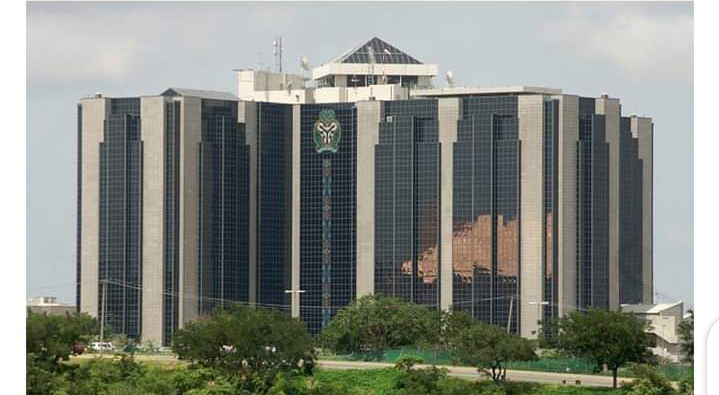

The Central Bank of Nigeria (CBN) has directed deposit money banks in the country to start charging 0.5% cybersecurity levy on some transactions done by their customers.
The apex bank gave the directive in a circular dated May 6, 2024 and sent to all commercial, merchant, non-interest and payment service banks as well as mobile money operators and payment service providers.
“Following the enactment of the Cybercrime (Prohibition, Prevention, etc) (amendment) Act 2024 and pursuant to the provision of Section 44 (2) (a) of the Act, ‘a levy of 0.5% (0.005) equivalent to a half percent of all electronic transactions value by the business specified in the Second Schedule of the Act’, is to be remitted to the National Cybersecurity Fund (NCF), which shall be administered by the Office of the National Security Adviser (ONSA),” the circular partly read.
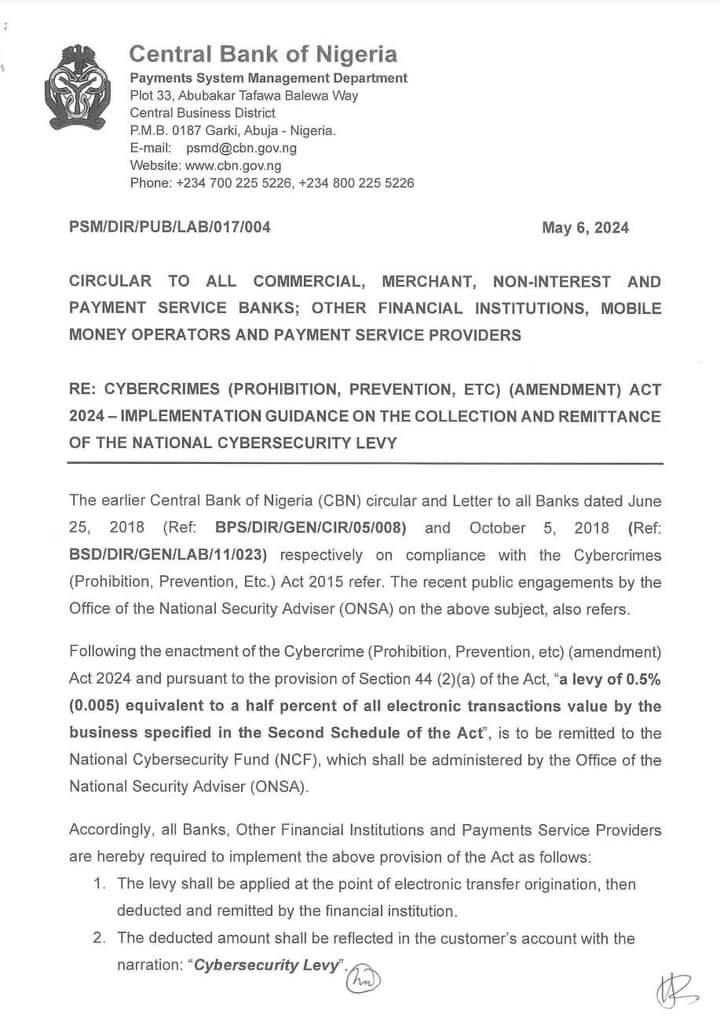

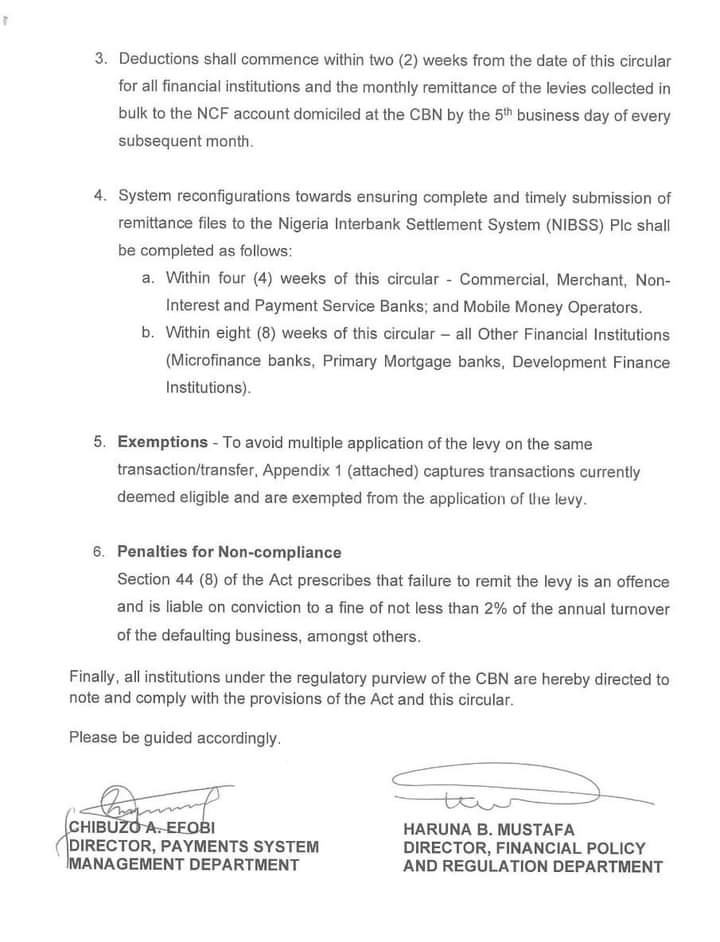

The apex bank said that the implementation of the levy would start two weeks from the date of the circular.
“The levy shall be applied at the point of electronic transfer origination, then deducted and remitted by the financial institution. The deducted amount shall be reflected in the customer’s account with the narration, ‘Cybersecurity Levy’. Deductions shall commence within two weeks from the date of this circular for all financial institutions and the monthly remittance of the levies collected in bulk to the NCF account domiciled at the CBN by the fifth business day of every subsequent month,” the circular said
The apex bank added that this new levy will not be applied on transactions such as loan disbursements and repayments, salary payments, intra-account transfers within the same bank or between different banks for the same customer, intra-bank transfers between customers of the same bank.
Also exempted from the levy were inter-branch transfers within a bank, cheque clearing and settlements, Letters of Credits, Banks’ recapitalisation-related funding only bulk funds movement from collection accounts, savings and deposits including transactions involving long-term investments, among others.
This current implementation however is not sitting well with some netizens as they reacted to the new development.
Here were some of their reactions from X.
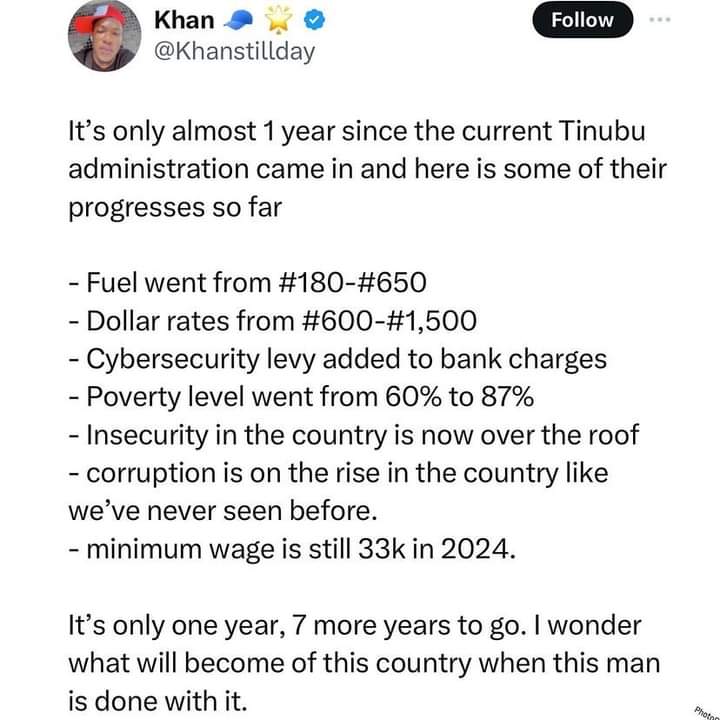



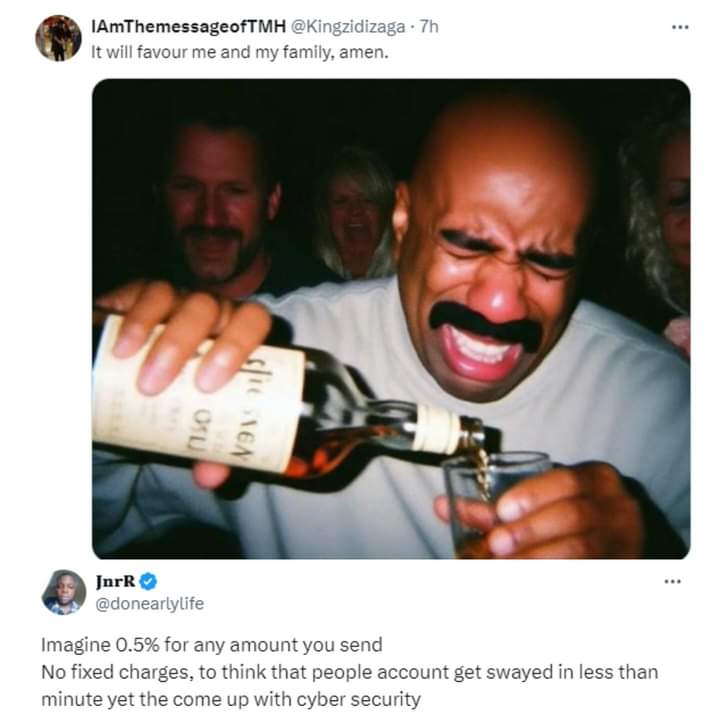

Finance
EFCC Chairman Tasks Nigerian Youths Against Crimes And Fraudulent Acts
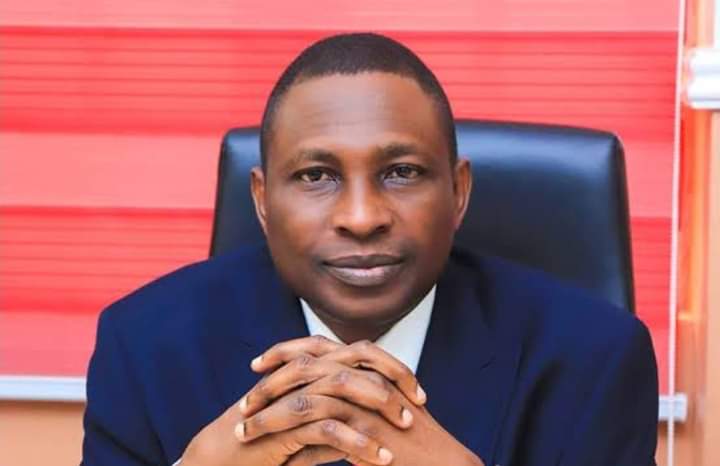

The Chairman of Economic Finance Crime Commission (EFCC), Ola Olukoyede, has stressed the need for Nigerian Youth to see themselves as agents of positive change that have a lot to contribute to the socioeconomic development of the Nation.
Speaking at the 2nd edition of a Leadership Trainings Programme in Abuja, Olukoyede, who was represented by the Head Enlightenment and Re-orientation unit, (EFCC), Aisha Mohammed, said the commission’s dream is to see the youth contribute meaningfully to the society, emphasizing on the need to work together in bringing positive change to society.
The Economic and Financial Crimes Commission Boss declared the readiness of his agency to work with all Stakeholders, including the youth towards changing the narrative and reposition the country to greater exploit.
Also speaking, the representative of the Executive Secretary of Tertiary Education Trust Fund (TETFUND), Sonny Echono, appealed to the youths is to eschew social vices that could deter their full potential in life.
Other speakers at the event, including the Chairperson, Zero Tolerance for Social Immoralities Initiative (ZEITI) Africa, Rasak Jeje called on all stakeholders to join hands in collective pursuit of empowering new generation of leaders to curb the rising tides of social Vice among Nigerian youths.
The Chairperson, Zero Tolerance for Social Immoralities Initiative (ZEITI) Africa, Rasak Jeje made the call while addressing journalists at the 2nd edition of it Leadership Trainings Programme in Abuja on Thursday.
He said the training was aimed to intimate students leaders with knowledge and insights that will help them drive positive change and become exemplary leaders in their respective spheres.
Finance
AISA Has Refunded The Fees Paid By Yahaya Bello To EFCC
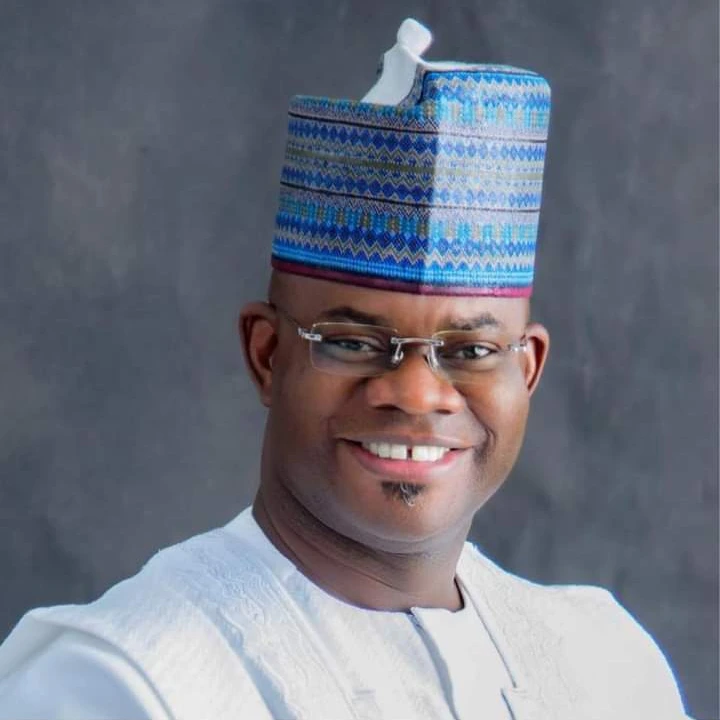

The Economic and Financial Crimes Commission (EFCC) says the American International School Abuja (AISA) has refunded the fees paid by the immediate past governor of Kogi state, Yahaya Bello, for his children attending the school.
In response to a letter addressed to the Lagos zonal commander of the EFCC, the school said $845,852 was paid in tuition “since the 7th of September 2021 to date”.
AISA said the sum to be refunded is $760,910 because it had deducted educational services already rendered.
“Please forward to us an official written request, with the authentic banking details of the EFCC, for the refund of the above-mentioned funds as previously indicated as part of your investigation into the alleged money laundering activities by the Bello family.
Since the 7th September 2021 to date, $845,852.84 (Eight Hundred and Forty-Five Thousand, Eight Hundred and Fifty Two US Dollars and eighty four cents) in tuition and other fees has been deposited into our Bank account.
We have calculated the net amount to be transferred and refunded to the State, after deducting the educational services rendered as $760,910.84. (Seven Hundred and Sixty Thousand, Nine Hundred and Ten US Dollars and Eighty Four cents).
No further additional fees are expected in respect of tuition as the students’ fees have now been settled until they graduate from ASIA.”
In a chat with The Cable, the spokesperson of the EFCC, Dele Oyewale, confirmed that the school has refunded the money.
‘’The money has been paid into public account,” Dele Oyewale was quoted as saying
-



 Politics3 days ago
Politics3 days agoLagos Water Corporation Starts Protest Against Sack Of Workers
-

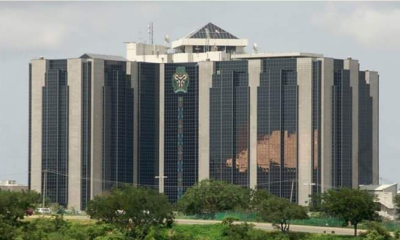

 Finance4 days ago
Finance4 days agoBanks To Now Charge 0.5% Cybersecurity Levy As Directed By CBN; Netizens React
-



 News3 days ago
News3 days agoEkiti Students Caught On Camera Bullying A Fellow Student, Have Been Expelled
-



 GRTech4 days ago
GRTech4 days agoSHELT SI Achieves Cisco Select Partner Certification
-



 Politics2 days ago
Politics2 days agoSenate Amends NDLEA Act, Approves Death Penalty For Dangerous Drugs Manufacturers And 15 Years Imprisonment For Users
-



 News2 days ago
News2 days agoRIMA Foundation Clocks 20 Years
-



 Spotlight2 days ago
Spotlight2 days agoYoung Man Named Young C, Delves Into The Challenge Of Being Buried Alive For 24 Hours
-



 News1 day ago
News1 day agoPrince Harry And Meghan Markle Arrive Nigeria Today, May 10th







